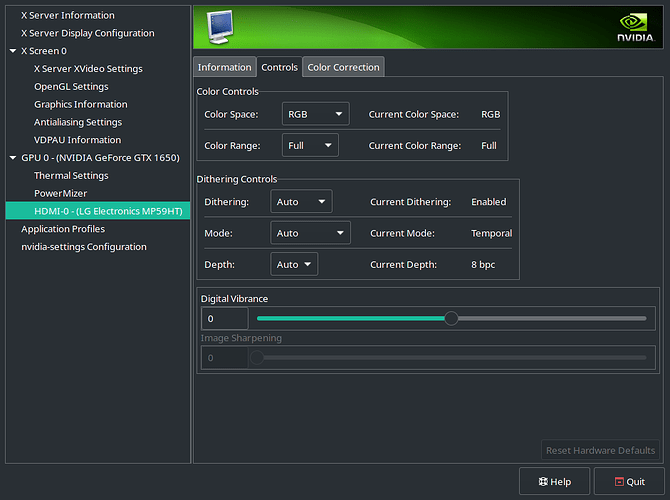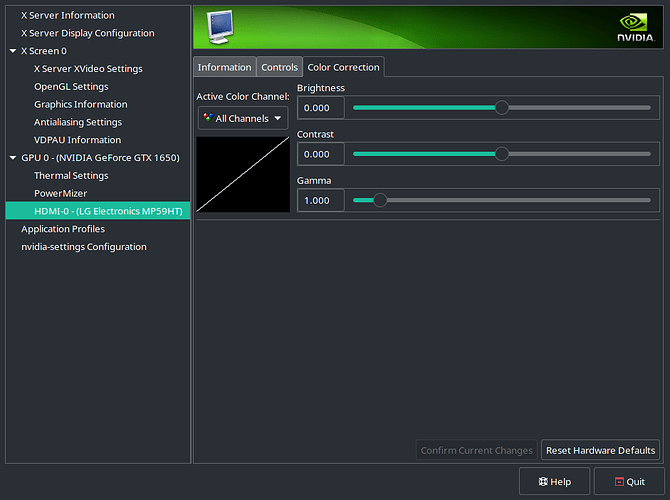I have an nvidia gpu and I’m trying to change the vibrancy of my screen - on windows it worked fine because I had the nvidia control panel but here I can’t seem to make it work - I have NVIDIA X Server Settings installed but I don’t see an option to change vibrancy. I used something called vibrantLinux but if i restarted my computer it lost its settings and the vibrancy doesnt work - anyone know?
Output to inxi:
~ inxi --width --no-host --filter --verbosity=7
System:
Kernel: 5.13.15-1-MANJARO x86_64 bits: 64 compiler: gcc v: 11.1.0
Desktop: Xfce 4.16.0 tk: Gtk 3.24.29 info: xfce4-panel, plank
wm: xfwm 4.16.1 vt: 7 dm: LightDM 1.30.0 Distro: Manjaro Linux
base: Arch Linux
Machine:
Type: Desktop System: Gigabyte product: B460MDS3H v: N/A serial: <filter>
Mobo: Gigabyte model: B460M DS3H v: x.x serial: <filter>
UEFI: American Megatrends v: F3 date: 05/27/2020
Battery:
Message: No system battery data found. Is one present?
Memory:
RAM: total: 15.56 GiB used: 1.51 GiB (9.7%)
RAM Report: permissions: Unable to run dmidecode. Root privileges required.
CPU:
Info: 6-Core model: Intel Core i5-10500 bits: 64 type: MT MCP
arch: Comet Lake rev: 3 cache: L2: 12 MiB bogomips: 74427
Speed: 800 MHz min/max: 800/4500 MHz Core speeds (MHz): 1: 800 2: 800 3: 800
4: 800 5: 800 6: 800 7: 800 8: 800 9: 800 10: 800 11: 800 12: 800
Flags: 3dnowprefetch abm acpi adx aes aperfmperf apic arat arch_capabilities
arch_perfmon art avx avx2 bmi1 bmi2 bts clflush clflushopt cmov constant_tsc
cpuid cpuid_fault cx16 cx8 de ds_cpl dtes64 dtherm dts ept ept_ad erms est
f16c flexpriority flush_l1d fma fpu fsgsbase fxsr ht hwp hwp_act_window
hwp_epp hwp_notify ibpb ibrs ibrs_enhanced ida intel_pt invpcid
invpcid_single lahf_lm lm mca mce md_clear mmx monitor movbe mpx msr mtrr
nonstop_tsc nopl nx pae pat pbe pcid pclmulqdq pdcm pdpe1gb pebs pge pln pni
popcnt pse pse36 pts rdrand rdseed rdtscp rep_good sdbg sep smap smep smx ss
ssbd sse sse2 sse4_1 sse4_2 ssse3 stibp syscall tm tm2 tpr_shadow tsc
tsc_adjust tsc_deadline_timer vme vmx vnmi vpid x2apic xgetbv1 xsave xsavec
xsaveopt xsaves xtopology xtpr
Graphics:
Device-1: NVIDIA GP107 [GeForce GTX 1050 Ti] vendor: Micro-Star MSI
driver: nvidia v: 470.63.01 bus-ID: 01:00.0 chip-ID: 10de:1c82
class-ID: 0300
Display: x11 server: X.Org 1.20.13 compositor: xfwm4 v: 4.16.1 driver:
loaded: nvidia resolution: 1920x1080 s-dpi: 96
OpenGL: renderer: NVIDIA GeForce GTX 1050 Ti/PCIe/SSE2
v: 4.6.0 NVIDIA 470.63.01 direct render: Yes
Audio:
Device-1: Intel vendor: Gigabyte driver: snd_hda_intel v: kernel
bus-ID: 00:1f.3 chip-ID: 8086:a3f0 class-ID: 0403
Device-2: NVIDIA GP107GL High Definition Audio vendor: Micro-Star MSI
driver: snd_hda_intel v: kernel bus-ID: 01:00.1 chip-ID: 10de:0fb9
class-ID: 0403
Device-3: Corsair CORSAIR HS60 HAPTIC Gaming Headset type: USB
driver: hid-generic,snd-usb-audio,usbhid bus-ID: 1-6:5 chip-ID: 1b1c:0a5f
class-ID: 0300
Sound Server-1: ALSA v: k5.13.15-1-MANJARO running: yes
Sound Server-2: JACK v: 1.9.19 running: no
Sound Server-3: PulseAudio v: 15.0 running: yes
Sound Server-4: PipeWire v: 0.3.35 running: no
Network:
Device-1: Realtek RTL8111/8168/8411 PCI Express Gigabit Ethernet
vendor: Gigabyte driver: r8169 v: kernel port: 4000 bus-ID: 03:00.0
chip-ID: 10ec:8168 class-ID: 0200
IF: enp3s0 state: up speed: 1000 Mbps duplex: full mac: <filter>
IP v4: <filter> type: dynamic noprefixroute scope: global
broadcast: <filter>
IP v6: <filter> type: noprefixroute scope: link
Device-2: Realtek RTL8192EE PCIe Wireless Network Adapter driver: rtl8192ee
v: kernel port: 3000 bus-ID: 04:00.0 chip-ID: 10ec:818b class-ID: 0280
IF: wlp4s0 state: down mac: <filter>
WAN IP: <filter>
Bluetooth:
Message: No bluetooth data found.
Logical:
Message: No logical block device data found.
RAID:
Message: No RAID data found.
Drives:
Local Storage: total: 1.02 TiB used: 45.44 GiB (4.4%)
ID-1: /dev/sda vendor: Gigabyte model: GP-GSTFS31120GNTD size: 111.79 GiB
speed: 6.0 Gb/s type: SSD serial: <filter> rev: 61.3 scheme: GPT
ID-2: /dev/sdb vendor: Seagate model: ST1000DM010-2EP102 size: 931.51 GiB
speed: 6.0 Gb/s type: HDD rpm: 7200 serial: <filter> rev: CC43 scheme: MBR
Message: No optical or floppy data found.
Partition:
ID-1: / size: 109.18 GiB used: 45.44 GiB (41.6%) fs: ext4 dev: /dev/sda2
label: N/A uuid: 4dabba46-d73a-4342-96f5-859c2418cd86
ID-2: /boot/efi size: 299.4 MiB used: 288 KiB (0.1%) fs: vfat dev: /dev/sda1
label: NO_LABEL uuid: 4D27-D28D
Swap:
Alert: No swap data was found.
Unmounted:
ID-1: /dev/sdb1 size: 931.51 GiB fs: ntfs label: DATA uuid: 0C0E8D9D0E8D8086
USB:
Hub-1: 1-0:1 info: Full speed (or root) Hub ports: 12 rev: 2.0
speed: 480 Mb/s chip-ID: 1d6b:0002 class-ID: 0900
Hub-2: 1-3:2 info: Genesys Logic Hub ports: 4 rev: 2.1 speed: 480 Mb/s
power: 100mA chip-ID: 05e3:0610 class-ID: 0900
Device-1: 1-3.1:4 info: SINOWEALTH Wired Gaming Mouse type: Mouse,Keyboard
driver: glorious,usbhid interfaces: 2 rev: 1.1 speed: 12 Mb/s power: 480mA
chip-ID: 258a:0036 class-ID: 0301
Device-2: 1-3.2:6 info: Holtek USB Keyboard type: Keyboard,HID
driver: hid-generic,usbhid interfaces: 2 rev: 2.0 speed: 1.5 Mb/s
power: 100mA chip-ID: 04d9:a01b class-ID: 0300
Hub-3: 1-4:3 info: Genesys Logic Hub ports: 4 rev: 2.0 speed: 480 Mb/s
power: 100mA chip-ID: 05e3:0610 class-ID: 0900
Device-1: 1-4.3:7 info: Micro Star MSI Gaming Controller type: HID
driver: hid-generic,usbhid interfaces: 1 rev: 1.1 speed: 12 Mb/s
power: 100mA chip-ID: 1462:3fa4 class-ID: 0300 serial: <filter>
Device-2: 1-6:5 info: Corsair CORSAIR HS60 HAPTIC Gaming Headset
type: Audio,HID driver: hid-generic,snd-usb-audio,usbhid interfaces: 4
rev: 2.0 speed: 12 Mb/s power: 500mA chip-ID: 1b1c:0a5f class-ID: 0300
Hub-4: 1-9:8 info: Genesys Logic Hub ports: 4 rev: 2.0 speed: 480 Mb/s
power: 100mA chip-ID: 05e3:0608 class-ID: 0900
Hub-5: 2-0:1 info: Full speed (or root) Hub ports: 8 rev: 3.0 speed: 5 Gb/s
chip-ID: 1d6b:0003 class-ID: 0900
Hub-6: 2-3:2 info: Genesys Logic Hub ports: 4 rev: 3.1 speed: 5 Gb/s
chip-ID: 05e3:0612 class-ID: 0900
Sensors:
System Temperatures: cpu: 27.8 C mobo: 16.8 C gpu: nvidia temp: 37 C
Fan Speeds (RPM): N/A gpu: nvidia fan: 35%
Info:
Processes: 291 Uptime: 5m wakeups: 0 Init: systemd v: 249 Compilers:
gcc: 11.1.0 clang: 12.0.1 Packages: pacman: 1404 Shell: Bash v: 5.1.8
running-in: xfce4-terminal inxi: 3.3.06

